
Laboratory manual for undergraduate Anatomy & Physiology 2
- Subject:
- Anatomy/Physiology
- Biology
- Health, Medicine and Nursing
- Material Type:
- Activity/Lab
- Reading
- Teaching/Learning Strategy
- Textbook
- Author:
- Julie Robinson
- Date Added:
- 07/30/2022

Laboratory manual for undergraduate Anatomy & Physiology 2
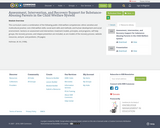
This curriculum covers a combination of the following public child welfare competencies: ethnic sensitive and multicultural practice; core child welfare skills; social work skills and methods; and human development and social environment. Sections on assessment and intervention; treatment models, principles, and programs, self-help groups, the recovery process, and relapse prevention are included, as are models of the recovery process. website resources, and pre- and posttests. (78 pages)Hohman, M. M. (1998).

This curriculum, which may be used in whole or in part, offers an overview of foster care, background on the characteristics of kin and non-kin foster parents, and trends in foster care. Special emphasis is placed on foster care recruitment, training, and retention efforts as well as the foster care payment rate structure. A comprehensive look at the elements that comprise quality of care in kinship and non-related foster homes is included. The curriculum highlights the philosophical reasons for providing quality care, the history and philosophy of kinship care, a legal history and brief policy analysis of kinship care, and domains of quality. Practice tips for child welfare workers and administrators are included, as well as a chapter where kin and non-kin foster parents address their relationship with the child welfare system and recent child welfare policies affecting foster parents and kinship caregivers. (332 pages)Berrick, J. D., Needell, B., Shlonsky, A., Simmel, C., & Pedrucci, C. (1998).

DISSENT BY DESIGN is a book that was produced during 2022-2023 in response to the Russian invasion of Ukraine on February 24, 2022. It was on this date that I began a social media campaign on LinkedIn that directly addressed the invasion of a Sovereign country by a rogue super power. As a Graphic Designer I felt it was my obligation to do all I can to bring attention to this atrocity and bring the narrative to the forefront of the conversation so that we help end this conflict in all theways we can. This book is a call to action, in the form of 'social media' posts throughout a one year period of time in our collective past, it is a documentation in chronological order of what happened, when and who was to blame and how many sufferred. FInally, this book illustrates how Graphic Designers can use their knowledge as storytellers to forward a conversation about the most important things in our lives and how to preserve them. We can be a vehicle of change and/or social engagement, to help people understand all the complex problems we face and to begin the process of solving those problems. This is a way forus to bring past narratives to light once again, to rejoin the conversations that have been lost, and to further discuss and provide solutions through dialogue and change.
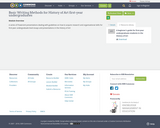
A series of Poweroint presentations dealing with guidelines on how to acquire research and organisational skills for first-year undergraduate level essays and presentations in the History of Art
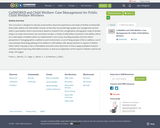
This curriculum is designed to educate social workers about the experiences and needs of families involved with both public welfare and child welfare services so that they can provide high-quality case management services within a post-welfare reform environment. Based on research from a longitudinal, ethnographic study of families living in an urban environment, the curriculum includes: a review of child welfare outcomes in the welfare reform era; a description of welfare reform as implemented in one county, including examples from the client's perspective of managing within a welfare-to-work environment; a cost of living analysis of life on welfare; a set of case examples illustrating pathways from welfare to child welfare, with special attention to aspects of welfare reform which may play a role in child welfare outcomes; and a discussion of how to apply qualitative research methods toward improving child welfare practice, as well as an explanation of the research methods used for the study. (187 pages)Frame, L., Berrick, J. D., Sogar, C., Berzin, S. C., & Pearlman, J. (2001).

This curriculum focuses on child maltreatment issues and effective practice strategies among immigrant Asian families. Specifically, it elucidates demographic and behavioral characteristics of child abuse victims and perpetrators in four major immigrant Asian communities (Cambodian, Chinese, Korean, and Vietnamese), factors contributing to the selection of two types of placement (in-home and out-of-home) by child protective services workers, and effective child welfare practice with immigrant Asian families. (106 pages)Rhee, S., Chang, J. (2006).

The three case studies written for this project reflect training needs in crucial parts of the child welfare system. They may be used individually or together, and each includes an introduction that highlights the area of child welfare practice that governs the situation, and a variety of classroom exercises. An effort was made to be ethnically sensitive by emphasizing language and cultural diversity differences in family lifestyles as expressed in parenting and disciplinary styles and varying cultural norms and values. The authors strongly recommend the use of collaborative teaching with guest speakers from local departments of Social Service, substance abuse programs, etc., to supplement the case studies. (93 pages)Brewer, L. K., Roditti, M., & Marcus, A. (1996).
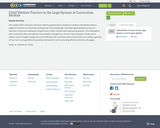
This module offers classroom instruction with the opportunity for students to observe child welfare workers, judges and referees, and attorneys during actual court proceedings. It provides approximately six hours of classroom content and addresses competencies in ethnic sensitive and multicultural practice, core child welfare skills, social work skills and methods, and workplace management. The curriculum provides a history of the system; cultural insights; background on the differing roles of professionals in the juvenile court setting; a glossary of court terms; and guidelines for proving maltreatment, and for providing effective testimony. (50 pages)Foster, D., & Woods, B. (1995).
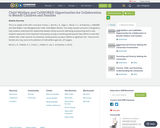
This is an update of the 2001 curriculum: Frame, L., Berrick, J. D., Sogar, C., Berzin, S. C., & Pearlman, J. CalWORKS and Child Welfare: Case Management for Public Child Welfare Workers. This newly revised curriculum is designed to help students understand the relationship between family economic well-being and parenting and to raise students’ awareness of the important role poverty can play in interfering with parents’ best efforts to raise their children well. Under extreme circumstances, family poverty can place children at significant risk – these are the families who may come to the attention of child welfare agencies. (215 pages)Berrick, J. D., Helalian, H. S., Frame, L., Fabella, D., Lee, K., & Karpilow, K. (2010).
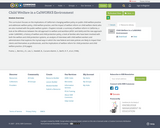
This curriculum focuses on the implications of California's changing welfare policy on public child welfare practice and addresses welfare policy, child welfare practice, and the impact of welfare reform on child welfare clients who are also involved with the public welfare system. Chapters include: a summary of welfare reform in California, a look at the differences between the old approach to welfare and workfare (AFDC and GAIN) and the new approach under CalWORKS, a history of welfare and child protection policy, a look at families who have been involved with both the welfare and child protection systems, an analysis of interviews with child welfare workers and administrators that explores the myriad ways in which the new federal and state policies are likely to impact their clients and themselves as professionals, and the implications of welfare reform for child protection and child welfare practice. (318 pages)Frame, L., Berrick, J. D., Lee, S., Needell, B., Cuccaro-Alamin, S., Barth, R. P., et al. (1998).
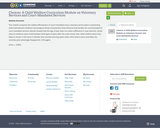
This module compares the relative effectiveness of court-mandated versus voluntary service plans in preventing child maltreatment recidivism and analyzes family characteristics that influence how families are recommended for court-mandated services. Results showed that the type of plan does not make a difference in case outcome; similar rates of recidivism were noted between both types of plans after the cases closed. Also, while children were more likely to remain in the home in families that received voluntary plans when other factors were controlled, the voluntary plan advantage disappeared. (145 pages) Jones, L. (2000).
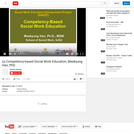
A 30 minute video introduction to competency-based social work education.

This curriculum combines systematic risk assessment (developed to address inconsistency and randomness in existing assessment tools and used to both identify factors which truly endanger children and illuminate strengths that may be build upon to ameliorate risk and preserve the family) with ethnographic interviewing (developed in response to a growing awareness of the importance of cultural differences in the helping process and the right of clients to receive culturally appropriate services). The combination of the two conceptual frameworks which helps clarify risks and strengths enables case plans and interventions to be more closely matched to what families are able and willing to do. (145 pages)Walker, P., & Tabbert, W. (1997).
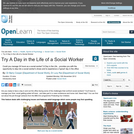
Are you ready to face a day in and out the office facing some of the challenges that confront social workers? You'll have to manage your time, avoid getting pulled off track - and take part in a case conference and home visit. Need help? You can find out about the job through extracts from the BBC/OU programme Protecting Our Children.

Course InformationCourse Description: ENG 220. Introduction to Language and Culture (3). Introduction to the study of language with a particular focus on American Englishes, including the history of American English. Focus is on cultural influence on language across the US and how the use of language is associated with power. Study of the basic building blocks of language. Study of variations of language across cultures and contexts, including contemporary and historical spoken, written, and digital registers and genres of American English. Examination of the effects of technology, culture, and context on language. Textbook & Course MaterialsRequired TextOur text for this course is the FREE, OER text More Than Words. You may access this text by clicking the Textbook tab in the course navigation. You may order a printed version of the text Links to an external site., but please keep in mind that you will need the digital version to access digital interactive content, such as videos.All other materials will be provided for you free of charge within the course via open links to internet sources and sources available via the YC Library.

This multi-component project studied the impact of the implementation of the Child Welfare Services/Case Management System (CWS/CMS) on child welfare practice by examining the casework practices affected by computerization, measuring the extent to which these practices were affected by computerization, and identifying organizational and individual factors that influenced the effect of computerization on these practices. Findings showed that the implementation of CWS/CMS did not lead to drastic changes in the ways in which CWSs carried out their daily work; time spent with clients was unchanged. However, the study demonstrated that CWS/CMS led to modest but crucial changes in how workers spent their time on the job, affected the quantity and quality of relationship with coworkers, and changed some workers' attitudes toward their agency and job. (Research Report: 135 pages; Curriculum: 154 pages; Training Academy Curriculum: 111 pages)Weaver, D., Furman, W., Moses, T., Linsdey, D., & Cherin, D. (1999).
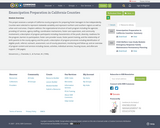
This project assesses a sample of California county programs for preparing foster teenagers to live independently. Counties were selected to represent statewide variability and represent northern and southern regions as well as urban and rural areas. Chapters address: the organizational structure of each program including the agencies providing ILP services, agency staffing, coordination mechanisms, foster care supervision, and community involvement; a description of program participants including characteristics of the youth, diversity, readiness for the program, barriers to participation, foster care provider issues, foster parent training, and the relationship of birth parents to the county agency and the youth; a description of program processes including identification of eligible youth, referral, outreach, assessment, out-of-county placement, monitoring and follow-up; and an overview of program content and services including classes, activities, individual services, housing issues, and aftercare support. (186 pages)Giovannoni, J., Chaneske, E., & Furman, W. (1996).

This is part 1 of a series of online exercises designed to demonstrate and allow students to practice what we consider the most useful, general functions of desktop EndNote for Windows. The online lessons and descriptive titles can be found in the Resources section, on the right side of your screen.Part 1 is focused on starting a new reference library and adding references from commonly used academic databases like OvidSP and CINAHL.Each lesson contains:general instructions describing what the student can expect to seespecific learning objectivesa main menu screen allowing them to choose between the demonstration and the practice exercisethe demonstration's duration timeThe demonstration part of each lesson:is narrated by the authoris not interactive includes text captionsThe practice part of each lesson:is not narrated contains more limited text prompts in place of detailed instructionsis interactiveThese lessons were created using Adobe Captivate 9 and published in HTML5 format, designed to be dropped into Moodle and used as HTML files. No grading or progress tracking is included in these lessons.They can be seen in action on KEATS (keats.kcl.ac.uk), the bespoke version of Moodle in use at King's College London. KEATS is not public, so please contact the authors for guest access or furher information regarding these lessons.
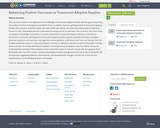
This curriculum explores the experiences and challenges of transracial adoptive families with the goal of improving the quality of services and supports provided to them. In addition, there is a growing subset of transracial adoptive families who choose to maintain contact with their child's birth family. Very little information exists to help these families or their child welfare workers understand the bumpy terrain of openness. This curriculum fills some of the many gaps in knowledge and practice. It includes summaries of transracial adoption literature, a theoretical discussion on normative development in transracial adoptive families, practice-oriented information including discussion questions and exercises, case vignettes, worker guidance, a self-assessment tool, and findings from the in-depth qualitative study of 12 transracial adoptive families in California conducted as part of this project. Findings themes include: the complicated factors involved in choosing transracial adoption; how the children and youth understand the meaning of their adoption; issues around the choice to maintain contact with the adopted child's birth family, the role of the contact, and the vulnerability of contact arrangements; the role of race in family life and development, negotiating different cultural worlds, and developmental changes; and the role of services and supports prior to and following adoption. (216 pages)Frasch, K., Brooks, D., Reich, J., & Wind, L. (2004).